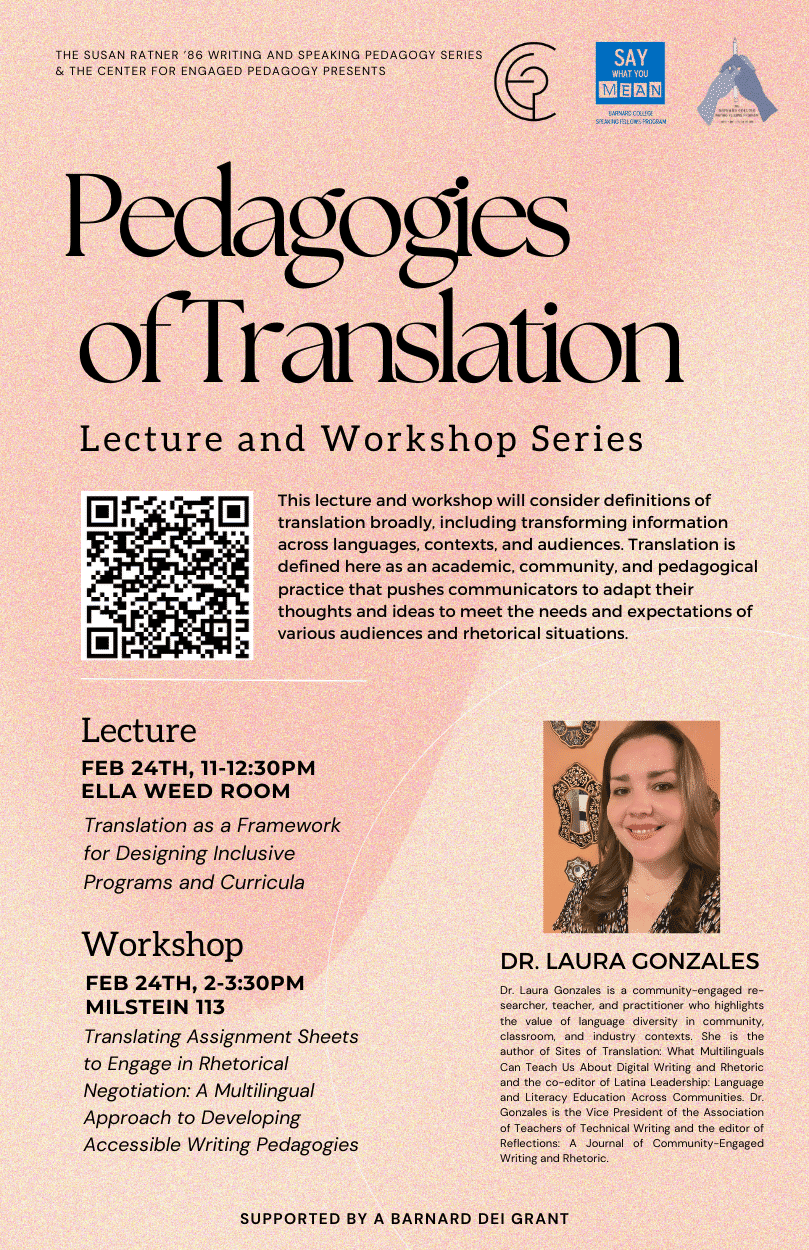Pedagogies of Translation: Lecture and Workshop Series
Pedagogies of Translation: Lecture and Workshop Series
Join us for an interactive lecture and workshop series with Dr. Laura Gonzales. Co-sponsored by the Susan Ratner ’86 Writing and Speaking Pedagogy Series and the Center for Engaged Pedagogy. Supported by the Barnard DEI Council Grant.
While translation is often assumed to be the transformation of words from one language to another, this lecture and workshop will consider definitions of translation broadly, including transforming information across languages, contexts, and audiences. Translation is defined here as an academic, community, and pedagogical practice that pushes communicators to adapt their thoughts and ideas to meet the needs and expectations of various audiences and rhetorical situations. Translation can encompass multiple activities, including researching different topics, learning about cultural preferences and ideologies, and collaborating with various stakeholders to make rhetorical decisions about how to adapt language.

Lecture: Friday, February 24th | 11-12:30pm | Ella Weed Room
Translation as a Framework for Designing Inclusive Programs and Curricula
In this presentation, Gonzales will argue that multilingual students, through their experiences with translation, have important strengths and experiences that should be centralized in the development of all writing programs. Drawing on ethnographic research with multilingual communicators in various contexts, Gonzales will demonstrate how the work of multilingual communities, such as translating, collaborating, and advocating, can inform pedagogies (in both writing courses and beyond) focused on social justice. Since multilingual communities are in the practice of making information accessible to various audiences, multilingual frameworks for rhetorically navigating communication can be useful avenues for teaching within and beyond the University. Centralizing translation as a tool for making information accessible and engaging in conversations about how meaning is negotiated across contexts can be useful to faculty and students across fields and disciplines, including the sciences and humanities.
Workshop: Friday, February 24th | 2-3:30pm | Milstein 113
Translating Assignment Sheets to Engage in Rhetorical Negotiation: A Multilingual Approach to Developing Accessible Writing Pedagogies
In this interactive workshop, attendees will apply translation frameworks and strategies, such as collaboration and negotiation, to the design and interpretation of writing assignment sheets. Using translation as a framework to understand how students interpret writing tasks can help writing instructors to better understand how the language we use to describe writing tasks can have multiple different interpretations. By centralizing translation as a regular classroom practice for all students, writing instructors can both make their classrooms more accessible for multilingual students and encourage all students to ask important questions about how writing-related concepts can take on different meanings based on rhetorical situations.
Dr. Laura Gonzales
Dr. Laura Gonzales is a community-engaged researcher, teacher, and practitioner who highlights the value of language diversity in community, classroom, and industry contexts. She is the author of Sites of Translation: What Multilinguals Can Teach Us About Digital Writing and Rhetoric (University of Michigan Press, 2018), which won the 2020 CCCC Advancement of Knowledge Award and the 2016 Digital Rhetoric Collaborative Book Prize, Designing Multilingual Experiences in Technical Communication (Utah State University Press, 2022), and the co-editor of Latina Leadership: Language and Literacy Education Across Communities, which won the 2023 CCCC Outstanding Book Award. Dr. Gonzales is the Vice President of the Association of Teachers of Technical Writing (ATTW) and the editor of Reflections: A Journal of Community-Engaged Writing and Rhetoric.
Event Recap
Pedagogies of Translation with Dr. Laura Gonzales was a captivating two-part event, centered around the significance of translation as a powerful pedagogical mode. Drawing from Dr. Gonzales's personal experience as a bilingual student and her research on bilingualism during her graduate studies, the event shed light on how what was initially perceived as a 'disadvantage' for students operating in an English-speaking classroom was actually a valuable asset for students. Laura observed that bilingual students often displayed remarkable creativity in communicating meaning beyond the confines of standard English.
During the workshop, Dr. Gonzales skillfully guided the attendees through an engaging exercise of 'translating' an assignment sheet, which is one that Dr. Gonzales frequently uses with her own students. The activity entails students working in small groups to define and translate words within the assignment sheet (e.g., 'thesis,' 'analyze,' 'synthesize'). Students write down words or short phrases on post-notes to define and translate these words and then share back their observations and translations with the larger class. By deconstructing the language used in the prompt, participants were encouraged to revise it in a manner that promoted clarity and comprehension. This exercise prompted instructors to reflect on elements they may not typically consider while crafting assignments, emphasizing the importance of using clear language and avoiding assumptions about students' understanding of common assignment prompts.